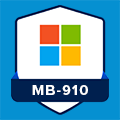
Duration: 2 Days
After successful completion of this MB-910 training course, candidates will be able to:
This exam covers the features and capabilities of Microsoft Dynamics 365 customer engagement
apps.
Candidates of this exam should have general knowledge of or relevant working experience in an
Information Technology (IT) environment. They should also have a fundamental understanding
of customer engagement principles and business operations.
As the prerequisites of Microsoft exam MB-910, learners should have a fundamental understanding of customer engagement principles and business operations. An understanding of cloud computing is helpful, but isn’t necessary.
Describe the Dynamics 365 Sales lifecycle
Describe Dynamics 365 Customer Service components
Describe the work order lifecycle
Identify Project Operations capabilities
Identify common customer engagement features
A Microsoft certified trainer.
£899+VAT
Clientele ➞























Our Partners




